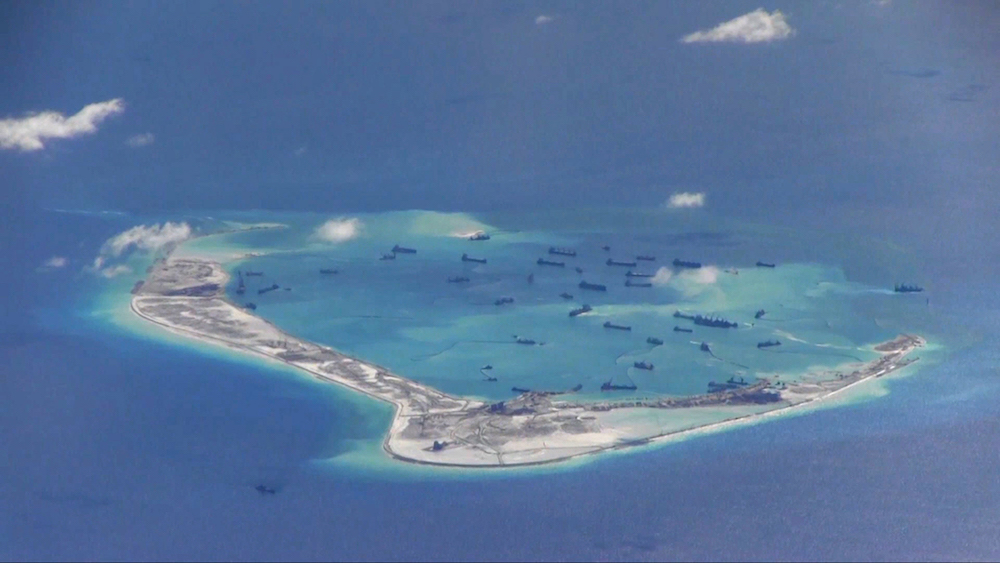China has suffered a severe legal defeat in arbitral proceedings regarding its claims in the South China Sea. Now, with Beijing flatly rejecting the decision, tensions are rising. Germany and its alliance partners will have to find new strategies for dealing with China.
China’s defiance of the arbitral decision on the South China Sea presents a serious challenge not only to the United States and its Asian allies, but to the entire international community.
The sweeping rejection of China’s claims by a tribunal at the Permanent Court of Arbitration in The Hague has increased the risk of an escalation of tensions in the contested region, especially if China chooses to reassert its own position on the ground. But even without further escalations and outright military conflict, China’s rejection of the July 12 decision on the South China Sea undermines German and European interests, the international legal order, and a multilateral approach to conflict resolution. It demonstrates that China’s integration into the international order is clearly conditional – meaning that leading European states need to work to prevent China from using coercion to enforce its claims elsewhere.
A Huge Blow to Chinese Claims
The tribunal delivered a remarkably sweeping legal victory to the Philippines, which had filed the case under the UN Convention on the Law of the Sea (UNCLOS) after it was unable to settle conflicting territorial claims bilaterally with China itself. As expected, China, which never accepted the court’s legitimacy, declared the decision “null and void.”
The ruling, a five-hundred page document, supports the Philippines’ submissions on almost all counts. In fact, the arbitrators have made any Chinese claim to large maritime zones legally impossible. They also determined that China had not only violated the Philippines’ sovereign rights through its land reclamation and interference with Philippine fishing and oil and gas exploration, but also violated obligations regarding protection of the marine environment and aggravated the dispute during the proceedings.
Clear Positions and New Instruments
The award and Beijing’s explicit non-compliance together constitute a turning point: China is openly breaking international law if it continues to deny the jurisdiction of the tribunal in The Hague and the fact that it is bound by the tribunal’s decision. Unfortunately, rather than constraining China, the award might actually reinforce Beijing’s resolve to establish China as the predominant power in the region by asserting its maritime and territorial interests more forcefully.
This means that a broad international coalition is necessary to prevent developments in the South China Sea from spiraling out of control. To build diplomatic leverage vis-à-vis China, new diplomatic and multilateral instruments, such as a “G7+ format” involving key actors in the region, will be necessary.
Governments that are committed to maintaining a law-based international order cannot let China off the hook; they will have to take a firm stand in defense of existing global rules. German and other European leaders should use the upcoming ASEM and G20 summits to publicly make their position clear. They have to be careful not to burn bridges by giving China the opportunity to be a part of the solution, but if Beijing decides to escalate further, a boycott of the G20 summit must be on the table.
The Risk of Further Escalation
A Chinese course correction is highly unlikely in the foreseeable future. Chinese official statements condemning the ruling and chalking the decision up to an American or Japanese conspiracy drive up domestic nationalist pressure, making it difficult for the government to find a “face saving” way out. The risk of escalation will increase further if other claimant states are tempted to use the new level of international support to advance their own interests. The new president of the Philippines, Rodrigo Duterte, has, however, announced that he wants to return to direct negotiations with China, which could allow for a temporary deescalation on the regional level.
The US is certain to continue its massive diplomatic campaign to “shame” China for its non-compliance. Depending on Chinese reactions, US military presence and support in the region, as well as its “Freedom of Navigation Operations,” could become more assertive.
It is mainly China’s behavior, however, that will determine the path forward in the months to come. While Beijing is unlikely to step up the pressure until after September’s G20 meeting, the situation might escalate if China’s leaders decide to respond forcefully. Beijing might reassert its claims by declaring an Air Identification Zone (ADIZ) over the South China Sea, deploying fighter jets on its new artificial islands and a more aggressive posture of its naval forces, including its fisheries militia. If China were to construct further artificial islands closer to others states’ coastlines, it would be a “red line” for many international observers.
Such an escalation would not only prevent successful management of regional tensions in the South China Sea for years, but would also increase the political pressure for Berlin to more explicitly take sides – making it difficult to act as a neutral intermediary between the US and China.







